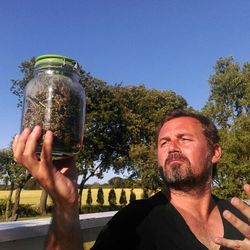Les Sources De Montmirail
Chateau des Sources
Costières-de-Nîmes Syrah Grenache 2014
Nice clean finish — 9 years ago
Vina Machali
Cabernet Sauvignon 2014
Had it with the winemaker: a vehement and honest French ex-pat who sources grapes from a couple of plots in the much-lauded Alto Cachapoal. Without touching the acidity or manipulating the alcohol, Machalí is elegant and poised, having precise aromas and complexity, but miles away from that über-common chocolate. — 9 years ago
Stottle Winery
Tempranillo
This Tempranillo from Stottle Winery is incredible! Notes of spice, blackberry, bing cherries, and tart strawberry. The grapes are sources from the Columbia Valley WA while Stottle is located in Hawks Prairie, Lacey, WA. — 10 years ago
A & P Morin
Saint-Jean Des Sources Picpoul De Pinet
Another picpoul in p-town :) — 12 years ago
Yves Cheron
Domaine du Grand Montmirail Cuvée Vieilles Vignes Gigondas Red Rhone Blend 2010
Dark Ruby with sweet dark fruit aromas and herb spice, a blend of 80% Grenache, 15% Syrah and 5% Mourvèdre. On the palate dark berry fruits with coffee & cacao on a dusty tannin structure. Lingering finish ending with herb notes. — 8 years ago
Domaine du Grand Montmirail
Muscat de Beaumes-de-Venise 2010
Special order Christmas dessert wine. Goes great with the Pud...much preferred to Sauternes — 9 years ago
Château Sigalas Rabaud
Sauternes Sémillon-Sauvignon Blanc Blend 2010
2010 - La Table du Lavoir at les Sources de Caudalie — 10 years ago
Landmark Vineyards
Overlook Sonoma County Chardonnay 2012
Nice tropical fruit. No signs of oak but a nice finish. 3 different sources of fruit I Cally. — 10 years ago
Domaine David Clark
Côte de Nuits-Villages Vielles Vignes Pinot Noir 2011
Retour aux (bonnes) sources ! — 11 years ago
Domaine Vincent Prunier
Meursault Chardonnay 2008
Located in Cote de Beaune, south of Volnay and north of Puligny Montrachet. Meursault ("Murr-so") has historically been Burgundy's center for white wine production. In fact, nearly all of the 2.5 million bottles produced from 440 ha (1,090 acres) are whites. The soil is a mixture of marl and chalk and is perfectly suited to the production of chardonnay. Meursault wines are known for aromas of hazelnuts, honey and vanilla for its aromas and creamy, almost olive oilllike texture. There are no grand crus in Meursault, though Les Perrières, Les Genevrières and Les Charmes produce remarkable wines. Further, some of the most well-known vineyards of Meursault such as Narvaux and Limozin are not premier cru but Villages-classified vineyards. Recent top vintages include 2008, 2007, 2005, 2002, 1999, 1996, 1993, 1990.
With 437ha. of vineyards dedicated to Villages wine or Premier Cru, Meursault has the largest area permitted to be planted in white wine in the Cote-d'Or. Furthermore, despite the fact that the village lacks even one grand cru, Meursault has historically been Burgundy's center for white wine production, in the past even more so than Puligny-Montrachet or Chassagne-Montrachet. While much of those two villages had in the past been planted to red grapes, Meursault has always been white wine territory. In fact, the modern day vineyard of Les Combettes in Puligny-Montrachet, which forms a continuous chain with the premier crus of Meursault, was once considered part of Meursault and not Puligny, where the many nearby vineyards produced red wine. There are several important factors that determine the reputation of Meursault. Primarily, the soil throughout most of Meursault is perfectly suited to the production of chardonnay; it is a mixture of marl and chalk, that when combined with a largely east or southeast exposure creates healthy grapes that are full of character. Another factor correlates to geology, though in a very different way. Meursault's high water table allows its residents to carve deep, cold cellars "perfect for the production of wine" into the chalky, stony soil. So, while large negociants from Beaune dominated the production and marketing of Burgundy throughout time, Meursault remained a wine of its own citizens. Contributing to this, since red wine has been more prized throughout time, these same negociants looked elsewhere for sources because the wine of Meursault has always been white.
What makes the wine so special? The most common descriptors attached to Meursault are hazelnuts, honey and vanilla for its aromas and creamy for its texture. However, this simplifies things quite a bit. In most cases, Meursault despite an almost olive-oil texture is countered by a precise mineral character, stoniness and a more refined overall palate than, for instance, Chassagne-Montrachet. It's the unique stony/mineral character that often gets lost when tasting Meursault, as many concentrate on the ripe, hedonistic primary flavors and aromas. It's the bipolarity of the wine, the interplay of both factors, that makes Meursault one of the most sought after white wines in the world. As mentioned above, there are no grand crus in Meursault, though many would argue that Perrieres, Genevrieres and Charmes can attain these lofty heights in the hands of the best producers. Further, some of the most well-known vineyards of Meursault such as Narvaux and Limozin are not premier cru but Villages-classified vineyards, though again, the best examples are clearly of higher quality. source: http://www.burgundywinecompany.com/wines/display.php?subregion=Meursault — 12 years ago
The Four Graces
Yamhill-Carlton Pinot Noir 2010
Four Graces is one of favorite sources of Pinot Noir in Oregon. This particular one is a fave. 2010 was a good year at Yamhill. — 9 years ago
Mas des Caprices
Retour Aux Sources Grenache Blend 2014
Encore un peu jeune, très prometteur — 9 years ago
Château Brown
Pessac-Léognan Red Bordeaux Blend 2009
2009 - Rouge at les Sources de Caudalie — 10 years ago
Brasseries Des Sources
Bellerose Biere Blonde
Fresh, floral, spicy — 10 years ago
Domaine du Grand Montmirail
Vacqueyras Red Rhone Blend 2011
Heard a bit too much about north Rhone today...so enjoying this on lamb chop night! — 11 years ago

Château de Montmirail
Cuvée des deux Frères Vacqueyras 2010
Rhone does California. Big ripe fruit with just the right amount of funk, spice, and earth. Yum! — 12 years ago












Sean K McNeely
Viticulture and Viniculture Assistant at Viña Vik Vineyard, Winery and Hotel
This is as pure and crystalline as the alpine streams that flow past the centuries old apple, pear and quince trees from which Jacques sources all of his fruit. Labeled as an apple, pear and quince wine and for good reason. Elegant and floral and absolutely symphonic. — 8 years ago